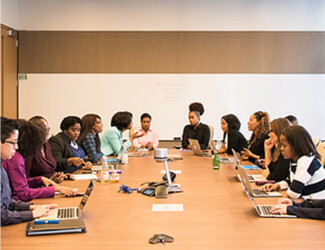The Swahili language or “Kiswahili” is discussed in relation to its history, geography, different dialects, and the spread of Kiswahili through the centuries. This chapter will also cover the status of the language in the world today and some aspects of cultural significance that the Swahili learner should be familiar with.
Kiswahili is a Bantu language that belongs to the Niger-Congo language family. The word Bantu means “people.” The languages of Baganda in Uganda, Sotho in Lesotho, Zulu in South Africa and Kamba in Kenya are other examples of Bantu languages. Although these languages are not mutually intelligible, they are all derived from one common ancestral language and share some basic vocabulary, word building processes and sentence structure.1 For example, the word for person in Kiswahili is mtu meaning “person” or watu meaning “people.” Both the singular and plural forms of the word are very similar in many Bantu languages as shown
Bantu Language | Country | Singular | Plural
|
Baganda | Uganda | omuntu | abantu |
Sotho | Lesotho | motho | bantu |
Zulu | South Africa | Umuntu | abantu |
Kamba | Kenya | mundu | andu |
Kiswahili was originally spoken along the East African Coast from Southern Somalia to the Northern part of Mozambique and has existed for more than 1,000 years. The word “Swahili” has been derived from the Arabic word “Sahel” meaning “coast.” The expansion of Swahili into the hinterland was facilitated by Coastal slave traders, merchants, missionaries and colonialists. The late Presidents Nyerere of Tanzania, Jomo Kenyatta of Kenya and Prime Minister Milton Obote of Uganda promoted Kiswahili during the struggle for independence (uhuru). President Nyerere promoted Swahili in many ways including the translation of two Shakespearean plays: The Merchant of Venice (Mabepari wa Venice) and Julius Caesar (Juliasi Kaisari). Nyerere also made Swahili the medium of instruction in elementary schools. Currently Kiswahili is mainly spoken in Tanzania, Kenya and Uganda.
In addition it is spoken to some extent in seven other countries or regions
in East and Central Africa, namely, Rwanda, Burundi, the Eastern part of the Democratic Republic of the Congo, Southern Somalia, Northern Mozambique, Malawi and Northern Zambia which together have a Swahili speaking population of roughly 50 million. Outside the East and Central Africa Region, Kiswahili is spoken in Oman, some parts of Madagascar, South Africa and Djibouti.
Kiswahili is spoken in more than 15 dialects throughout East and Central Africa. The Kiunguja dialect of Zanzibar has been adopted as Standard Swahili since 1935 and is used by the media, as a medium of instruction in schools and in business transactions.
Other major dialects are Kimvita, Kiamu, Kipemba and Kitumbatu based in Mombasa, Lamu, Pemba and Unguja Islands respectively. Apart from these dialects, there are other dialects of people living in the interior of East and Central Africa, which tend to reflect the tribal languages of different Bantu speaking peoples.
As a consequence of interaction between the local people and foreigners, Kiswahili has many loan words from other languages such as Arabic, English, German, Portuguese, Persian and Hindi. It has been estimated that foreign words in the Swahili language make up approximately 30% of the vocabulary, with the majority coming from Arabic.
While it is true that Swahili uses many foreign words, it is also true to say that the Swahili people have adapted foreign words to meet their own needs. For example, borrowed words that have closed vowels (i.e. ending with consonants) have been changed so that they have open vowels (i.e. ending with a vowel). Also some loan words have completely changed their meaning. For example, the word rafiki (friend) is originally taken from the Arabic word “rafiki” meaning “trusted one.” Furthermore, it has been shown that the origin of some loan words cannot be traced to any particular language. In addition, Swahili has contributed words to the English vocabulary such as the word safari, which means “journey.” The great explorer, Sir Richard Francis Burton, who visited the East African Coast in the middle of the 19th Century, had this to say about the language:
Kiswahili is both rich and poor. . . . It abounds in names of sensuous objects; there is a term for every tree, shrub, plant, grass, and bulb, and I have shown that the several ages of cocoa-nut are differently called. . . . Abounding in vowels and liquids, the language admits a vast volubility of utterances; in anger or excitement, the words flow like a torrent, and each dovetails into its neighbor until the whole speech becomes one vocabule.
Kiswahili has attained an international status. The African Union, formerly the Organization of African Unity (OAU), has adopted Kiswahili as one of the official languages of Africa. For many years, major radio networks have been broadcasting Swahili programs. They include the BBC, Voice of America, Radio South Africa, Deutschewel (Germany), Radio Cairo, Radio Japan, Radio Beijing, All India Radio and Radio Moscow International. Many universities and colleges in Europe, Asia, North America and other parts of Africa have Swahili programs.
Also, Swahili has been used in some North American movies such as Hotel Rwanda, the Last King of Scotland, the Lion King and Darwin’s Nightmare.There are also several popular Swahili songs known throughout the world such as Hakuna Matata (No worries), Malaika Nakupenda Malaika (Angel, I love you Angel) and Jambo Bwana (Hello Mister). In addition, some English songs such as All Night Long (by Lionel Ritchie) and Liberian Girl (by Michael Jackson) have Swahili phrases in them.


